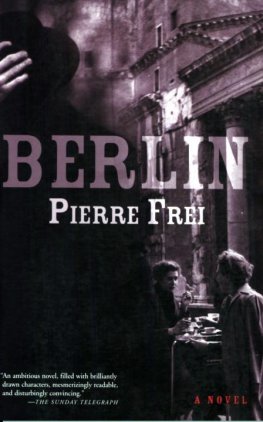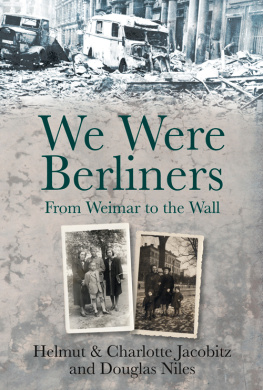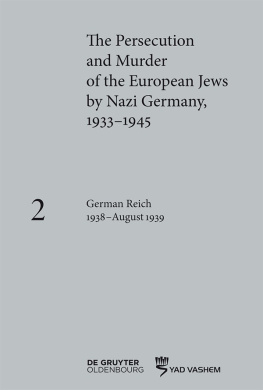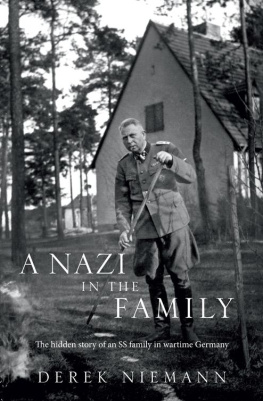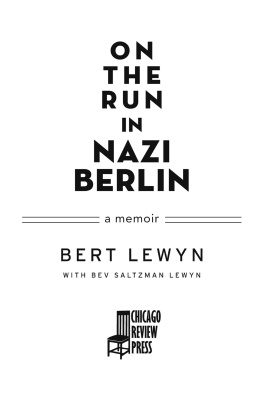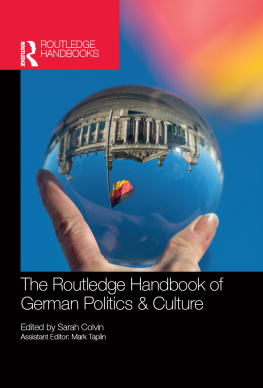EXIT
BERLIN
EXIT
BERLIN
How One Woman
Saved Her Family
from Nazi Germany
Charlotte R. Bonelli
With translations from the German by
Natascha Bodemann

Published with assistance from the foundation established in memory of Philip Hamilton McMillan of the Class of 1894, Yale College.
Copyright 2014 by the American Jewish Committee.
All rights reserved.
This book may not be reproduced, in whole or in part, including illustrations, in any form (beyond that copying permitted by Sections 107 and 108 of the US Copyright Law and except by reviewers for the public press), without written permission from the publishers.
Yale University Press books may be purchased in quantity for educational, business, or promotional use. For information, please e-mail sales.press@yale.edu (US office) or sales@yaleup.co.uk (UK office).
Designed by Lindsey Voskowsky.
Set in Bodoni and Adobe Caslon type by Integrated Publishing Solutions.
Printed in the United States of America.
Library of Congress Cataloging-in-Publication Data
Bonelli, Charlotte, 1956
Exit Berlin : how one woman saved her family from Nazi Germany / Charlotte Bonelli ; with translations from the German by Natascha Bodemann.
pages cm
Includes bibliographical references and index.
ISBN 978-0-300-19752-5 (hardback)
1. Hatch, LuzieFamilyCorrespondence. 2. Hatch, ArnoldCorrespondence. 3. JewsGermanyCorrespondence. 4. JewsUnited StatesCorrespondence. 5. Holocaust, Jewish (19391945)Personal narratives. 6. World War, 19391945JewsGermany. I. Bodemann, Natascha, translator. II. Title.
DS134.4.B66 2014
940.53'180922dc23
[B] 2013041647
A catalogue record for this book is available from the British Library.
This paper meets the requirements of ANSI/NISO Z39.481992 (Permanence of Paper).
10 9 8 7 6 5 4 3 2 1
For my three aunts of blessed memory, Carmela Bonelli, Beatrice Spector, and Ida Spector, each a unique treasure. If I had only had one such aunt, I could have said Dayenu. That I had three was surely a blessing from the Good Lord.
CONTENTS
PART ONE
May 1933September 1938
PART TWO
December 1938August 1939
PART THREE
September 1939October 1941
ACKNOWLEDGMENTS
Long ago, when I was a graduate student applying for an independent project, my adviser warned me, with a sharply pointed finger, Writing is a solitary process. In terms of Exit Berlin, she was only partially correct. Researching and writing the book did include innumerable solitary hours, but the book also introduced me to an array of warm and wonderful people. This was an unexpected joy of Exit Berlin. I am pleased to be able to thank all of those who contributed.
Often people dont realize the historic value of items, tossing them into the trash, where they are forever lost. Fortunately, this was not the case when Attorney Roger Blane discovered Luzie Hatchs correspondence. He was determined to save the collection and bring it to the public. It was Roger who called me to discuss donating the correspondence to the American Jewish Committee Archives. In expressing my thanks to him, I speak not only for myself but for the entire AJC family. I would also like to thank Attorney Steve Solomon, Luzies estate executor, for his interest and cooperation in this project. Exit Berlin would not have been possible without their support.
Ralph Hatch, Luzie Hatchs half-brother, supplied documents, photos, and very valuable memories. He opened his home to me on many occasions, each visit being not only productive but enjoyable thanks to his wonderful sense of humor and hospitality. Pat Roth, Arnold Hatchs granddaughter, and Gloria Hatch, his daughter-in-law, are also to be thanked for their cooperation. As probably is always the case, this project turned out to be lengthier than anticipated. Still, Pats interest in the project never wavered.
Inge Friedlander, Hilde belacker, Fred Kirschner, and Eva Emmerich all granted me interviews, recalling their World War II experiences. These interviews were not always easy, for they called forth extraordinarily painful memories, in some instances, experiences that until our meeting had been completely locked away. I greatly appreciate their efforts. The stories they told and the information they supplied added a new dimension to this book. I also communicated with a number of people via email or phone. All were cooperative and instrumental in putting me on the right research path. Rose Feldman, webmaster of the Israel Genealogical Society; Michael Merose and Dan Mendels, two of Luzie Hatchs descendants; the late Henry Rodwell, a former L. S. Mayer employee; and Michael Chaut are all due huge thanks. Ilse Ohlms kindly volunteered to work with the letters written in old German script, rewriting them in modern script and thereby saving Natascha Bodemann, the translator, both time and angst.
Visits to the Landesarchiv in Berlin and the Stadtmuseum/-archiv in Baden-Baden were extremely productive. I am truly indebted to Dagmar Rumpf, of the Baden Archiv, who put me in contact with Hilde belacker, a Camp Gurs survivor, and Angelika Schindler, a historian of Badens Jewish community. Not only did Angelika fill in important details about Jewish life in Baden, but she led me to another Gurs survivor, Fred Kirschner. Here in the United States, the Spindle Historical Society provided images of Arnold Hatchs factory. I researched the American roots of Luzies family at Congregation Beth Emeth, in Albany, New York. What a pleasure it was to see how the synagogue has preserved its history. In addition, I would like to note how warmly I was received by the Beth Emeths archivists, Adelaide Muhlfelder and Patricia Snyder. Lisa Adele Miller, a dear college friend of mine, generously pitched in on some of the Albany-related research. Misha Mitsel and Sherry Hyman of the American Joint Distribution Committee Archives, in typical fashion, went out of their way to be helpful.
At times, despite exhaustive research, I was still left with unanswered questions about elements of this period in history. I thank Richard Evans of Cambridge University and Marion Kaplan of New York University for taking the time to answer my queries.
Many people from the American Jewish Committee, past and present, deserve thanks for their help: Roselyn Bell, Ephraim Gabbai, Shifra Sharbat, Mirja Muller, Larry Grossman, and Lena Altman. My dedicated assistants, Cuc Huong Do and Desiree Guillermo, are deserving of special praise. With their characteristic positive demeanor and efficiency, they performed a seemingly endless list of tasks related to this book. Linda Krieg, AJCs director of graphic arts, was a constant source of encouragement, even in the face of some obstacles and inevitable delays. Marilyn Braverman, now retired from AJC, offered information on Luzies work history. Gerri Rozanski, former director of AJCs regional offices, was the one person who had a close personal relationship with Luzie. With her information and stories, a more complete understanding of Luzie emerged. A special thanks to AJC Executive Director David Harris for his encouragement and interest in this project.
Lydia Freudenstein read early versions of the manuscript, offering many solid suggestions. Liora Brosh, a friend of many years and an outstanding English professor, convinced me that the letters could be framed in a narrative. I was skeptical but am glad that she persisted. My sister, Deborah Bonelli, brother, Jonathan, and mother, Esther, listened to endless conversations about this book. And it was my sister who changed the title from
Next page

